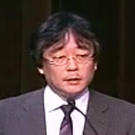I Want to Learn How to Think Beyond Academic Disciplines
Vol.7 2014.03.27 MORIYAMA, Takumi
“Elimination” from a Social Anthropological Perspective
March 27-28, 2014
Social Anthropology is an academic field that engages in fieldwork in a particular place and studies the lives of the people and social organizations there on the basis of the fieldwork. In this lecture, I will first provide an overview of the history of the discipline and fieldwork as its method so that you will have a better understanding of this academic field. I will then dwell on how we might approach the theme of “elimination” from the social anthropological standpoint. “Elimination,” as in excretion, can be highly physical, and it goes without saying that it intersects with theories of the body. However, even without limiting our scope to the physical level, we may think of a certain social group and a kind of social dynamics at work there, in which something becomes “taken in” from outside, is “digested,” and then is “eliminated” to outside. We may also think of another process in which what has been “eliminated” is given a different meaning, “incorporated,” and “reused.” In this lecture, while understanding “elimination” in the physical sense, we will extend our scope to the metaphoric realm, thereby considering “elimination” on various levels ranging from individual to social.
- Instructor
-

- MORIYAMA, Takumi
- Professor at the Department of Area Studies, Graduate School of Arts and Sciences Professor Moriyama has been serving in the current position since 2012, after serving as Full-time Lecturer and Assistant Professor at Hiroshima City University; Assistant Professor and Associate Professor at the Department of Area Studies, Graduate School of Arts and Sciences , The University of Tokyo. While his research centers around the Malagasy society and its cultural anthropological explorations, his interests extend to issues of colonialism and wider Francophone cultures. His research areas include: 1) cultural anthropological research based on fieldwork in certain areas in Madagascar; 2) Malagasy linguistics relying on studies of Malagasy culture; 3) study of wider regional cultures attending to Madagascar's historical relationship with France and Europe; 4) contribution to general theories of cultural anthropology on the basis of studies of Madagascar and Malagasy-French relations, which aims to craft a theoretical framework with general scopes of cultural anthropology by using detailed sources on Malagasy society and culture that have been gained through methodologies of cultural anthropology and area cultural studies; research on the disciplinary methods of cultural anthropology.
Post a Comment
- Other Lessons